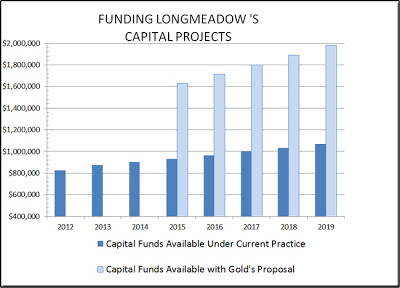ALEX GRANT, after writing a bi-weekly column for the Longmeadow
News on town issues since 2007, announces that he is running for one of the
two open seats on the Longmeadow Select Board.
The election is June 11.
The
announcement comes a few days after the annual Longmeadow Town Meeting, in
which the Select Board’s proposed annual budget was defeated. GRANT spoke at Town Meeting in favor of a
compromise budget that restored some of the cuts to the School Department. The cuts advanced by the Select Board would
have decimated the renowned Longmeadow music department, led to layoffs of
teachers, and increased class sizes.
GRANT
stated at Town Meeting, “I wish we could send the Select Board back to the
drawing board” on the budget. He noted
that the Select Board budget’s across-the-board cuts in services also hurt
seniors in town.
GRANT
criticized the Select Board’s policy of taking money from needed town services to
put the funds into capital spending at a time when there is no capital
plan. Despite the claims of the Select
Board and the Town Manager to the contrary, GRANT quoted the interim town
manager at the March 6, 2013 budget forum as saying, “There is no capital
plan, there should be, there needs to be, it would be better if the capital
recommendations for FY 14 were in the context of a capital plan.” GRANT asked that anyone doubting his
recitation of the facts to view the DVD recording of the budget forum, read the
news story in The Reminder, or to go to his website www.AlexGrantLongmeadow.org to see for
themselves the statements from the budget forum.
The compromise budget supported by
GRANT, the School Committee, and two members of the Select Board passed
overwhelmingly. GRANT said that the
Town Meeting result shows that the Select Board is out of step with the voters
and that change is needed.
GRANT, who
works as a federal prosecutor, also coaches youth soccer, basketball, and track
in Longmeadow. GRANT is a graduate of
Stanford University and Cornell Law School.
In
making the announcement, GRANT said, “I am running to
open up our town government by writing about it, by telling residents what
really goes on at the Select Board, and by listening to residents more than the
Select Board does now. In recent years, town politics has been a
conversation involving a fairly small number of people, and that needs to
change. We need to engage a larger number of voters if Longmeadow is
going to move forward and be a great place to live for people of all ages.”
GRANT
reminded residents that the passage of the compromise budget was a limited
victory that merely mitigated the cuts to services contemplated by the Select
Board budget. The budget passed was
still closer to the 0% Select Board approach than to maintaining level
services. GRANT does not want to see
the quality of life in Longmeadow diminished.
GRANT said, “If you want to have a
shot at avoiding these same kinds of cuts to services next year, you need to
vote on June 11 to change the lineup on the Select Board. Otherwise, we will be
having the same conversation next year. The choice between the two incumbents
and me for the two open seats is clear.”
Voters will
have a chance to visit GRANT’s booth and meet the candidate in person at
Longmeaddowe Days on May 18 and 19.


